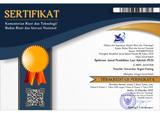Relationship Between SEM Training (Smart Entrepreneur Model) With Attitude PMW Participant Students in Running Business
 ), Alim Harun Pamungkas(2),
), Alim Harun Pamungkas(2), (1) Universitas Negeri Padang
(2) Universitas Negeri Padang
 Corresponding Author
Corresponding Author
DOI : https://doi.org/10.24036/spektrumpls.v9i2.112745
Full Text:
 Language : en
Language : en
Abstract
This research is motivated by the low attitude of the students participating in the PMW (Student Entrepreneurial Program) in running a business, this is presumably because it has something to do with the SEM (Smart Entrepreneur Model) training held by UPKK UNP properly. This study aims to: 1) describe the implementation of SEM (Smart Entrepreneur Model) training; 2) describe the attitudes of PMW participants in running a business; and 3) see the relationship between the Smart Entrepreneur Model Training and the attitudes of PMW participants in running a business. This type of research is quantitative research with correlational descriptive technique. The population of this study were all participants of the Smart Entrepreneur Model training, totaling 85 students. While the research population was 43 students who were taken using simple random sampling technique. Data collection techniques in the form of a Likert scale with data collection tools in the form of a questionnaire. The data analysis technique uses the percentage formula and product-moment correlation. The results showed that: (1) The implementation of the SEM (Smart Entrepreneur Model) training had not been carried out properly, (2) The attitude of the PMW participant students in running a business was relatively low, (3) There was a significant relationship between the SEM (Smart Entrepreneur Model) training and the attitude of PMW participants in running a business. It is recommended to UPKK UNP as the organizer of the SEM (Smart Entrepreneur Model) Training to improve and further improve the implementation of the training to improve students' abilities in entrepreneurship and to PMW participating students to be more active in participating in training so that knowledge and knowledge in entrepreneurship will increase.
References
Alma, B. (2016). Kewirausahaan. Bandung: Alfabeta.
Arikunto, S. (2016). Prosedur Penelitian: Suatu Pendekatan Praktik. Jakarta: Rineka Cipta.
Aulia, L. O. A., Rianse, U., & Abdullah, W. G. (2018). Efektivitas Program Mahasiswa Wirausaha (PMW) dalam Meningkatkan Kemampuan Berwirausaha Mahasiswa Universitas Halu Oleo (UHO). Jurnal Ilmiah Membangun Desa Dan Pertanian, 3(2), 50–55.
Azwar, S. (2013). Sikap Manusia: Teori dan Pengukurannya. Yogyakarta: Pustaka Pelajar.
Djamarah, S. B. (2012). Psikologi Belajar. Jakarta: Rineka Cipta.
Heidjarachman, Ranupandojo, & Husnan, S. (2012). Manajemen Personalia. Yogyakarta: BPFE Yogyakarta.
Hendriani, S., & Nulhaqim, S. A. (2008). Pengaruh Pelatihan dan Pembinaan dalam Menumbuhkan Jiwa Wirausaha Mitra Binaan PT. Pelabuhan Indonesia cabang Dumai. 10(2).
Kamil, M. (2012). Model Pendidikan dan Pelatihan: Konsep dan Penerapannya. Bandung: Alfabeta.
Nurjoko. (2014). Rancang Bangun Model Seleksi Program Wirausaha Mahasiswa Berbasis WEB. Proceeding Seminar Bisnis & Teknologi. Bandar Lampung: Lembaga Pengembangan Pembelajaran, Penelitian & Pengabdian kepada Masyarakat.
Pamungkas, A. H. (2014). Pengelolaan Pelatihan Dalam Organisasi (Tinjauan Teori Pembelajaran Orang Dewasa). Spektrum: Jurnal Pendidikan Luar Sekolah. Retrieved from https://scholar.google.co.id/citations?user=2sSPGJUAAAAJ&hl=id&oi=ao#d=gs_md_cita-d&u=%2Fcitations%3Fview_op%3Dview_citation%26hl%3Did%26user%3D2sSPGJUAAAAJ%26citation_for_view%3D2sSPGJUAAAAJ%3A9yKSN-GCB0IC%26tzom%3D-420
Saputra, R. W. (2016). Pengaruh Efikasi Diri dan Pengetahuan Kewirausahaan terhadap Minat Berwirausaha pada Siswa Kelas XI SMK Muhammadiyah Delanggu tahun Ajaran 2015/2016.
Siagian, P. S. (2012). Manajemen Sumber Daya Manusia. Jakarta: Bumi Aksara.
Sudjana, D. (2007). Sistem dan Manajemen Pelatihan. Bandung: Publishing.
Sujanti. (2009). Program Wirausaha. Jakarta: Dikti.
Sumiati & Asra. (2013). Metode Pembelajaran. Bandung: CV Wacana Prima.
 Article Metrics
Article Metrics
 Abstract Views : 468 times
Abstract Views : 468 times
 PDF Downloaded : 107 times
PDF Downloaded : 107 times
Refbacks
- There are currently no refbacks.

This work is licensed under a Creative Commons Attribution-NonCommercial 4.0 International License.



